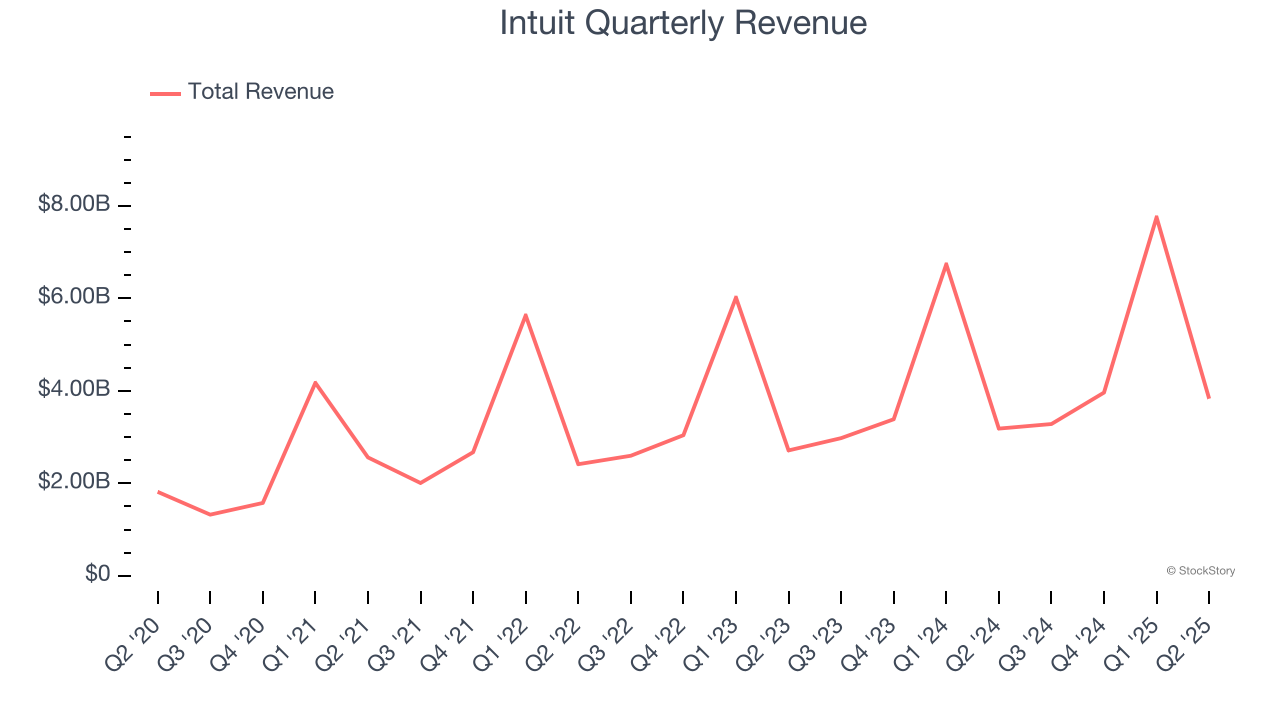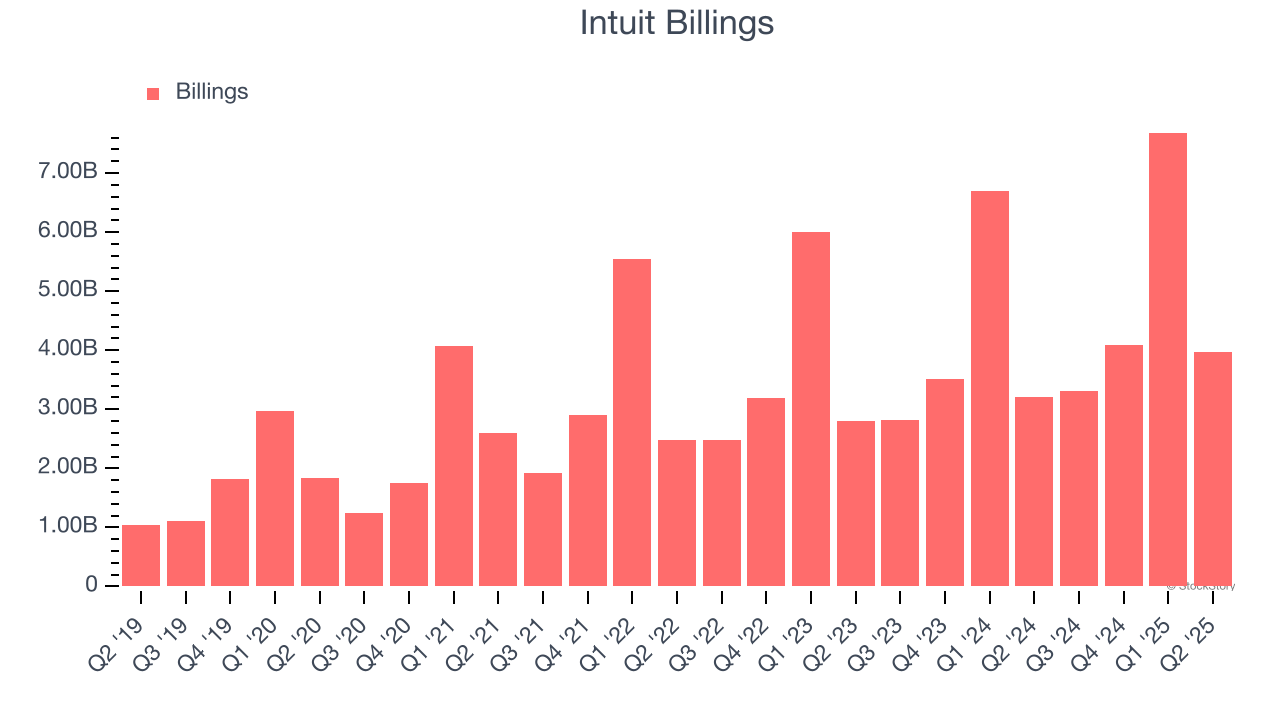
Financial technology platform Intuit (NASDAQ: INTU) announced better-than-expected revenue in Q2 CY2025, with sales up 20.3% year on year to $3.83 billion. On the other hand, next quarter’s revenue guidance of $3.76 billion was less impressive, coming in 1.5% below analysts’ estimates. Its non-GAAP profit of $2.75 per share was 3.4% above analysts’ consensus estimates.
Is now the time to buy Intuit? Find out by accessing our full research report, it’s free.
Intuit (INTU) Q2 CY2025 Highlights:
- Revenue: $3.83 billion vs analyst estimates of $3.75 billion (20.3% year-on-year growth, 2.1% beat)
- Adjusted EPS: $2.75 vs analyst estimates of $2.66 (3.4% beat)
- Adjusted Operating Income: $1.02 billion vs analyst estimates of $1.01 billion (26.5% margin, 0.9% beat)
- Revenue Guidance for Q3 CY2025 is $3.76 billion at the midpoint, below analyst estimates of $3.82 billion
- Adjusted EPS guidance for the upcoming financial year 2026 is $23.08 at the midpoint, in line with analyst estimates
- Operating Margin: 8.8%, up from -4.7% in the same quarter last year
- Free Cash Flow Margin: 9.3%, down from 56.2% in the previous quarter
- Billings: $3.97 billion at quarter end, up 23.4% year on year
- Market Capitalization: $195 billion
“We had an exceptional fiscal 2025 with 20 percent growth in the fourth quarter and 16 percent growth for the full year,” said Sasan Goodarzi, Intuit’s chief executive officer.
Company Overview
Originally named after its founding product "Intuitive for the first-time user," Intuit (NASDAQ: INTU) provides financial management software and services including TurboTax, QuickBooks, Credit Karma, and Mailchimp to help consumers and small businesses manage their finances.
Revenue Growth
A company’s long-term performance is an indicator of its overall quality. Any business can have short-term success, but a top-tier one grows for years. Over the last three years, Intuit grew its sales at a 14% compounded annual growth rate. Although this growth is acceptable on an absolute basis, it fell short of our standards for the software sector, which enjoys a number of secular tailwinds. Luckily, there are other things to like about Intuit.

This quarter, Intuit reported robust year-on-year revenue growth of 20.3%, and its $3.83 billion of revenue topped Wall Street estimates by 2.1%. Company management is currently guiding for a 14.5% year-on-year increase in sales next quarter.
Looking further ahead, sell-side analysts expect revenue to grow 12.4% over the next 12 months, a slight deceleration versus the last three years. We still think its growth trajectory is satisfactory given its scale and indicates the market is baking in success for its products and services.
Software is eating the world and there is virtually no industry left that has been untouched by it. That drives increasing demand for tools helping software developers do their jobs, whether it be monitoring critical cloud infrastructure, integrating audio and video functionality, or ensuring smooth content streaming. Click here to access a free report on our 3 favorite stocks to play this generational megatrend.
Billings
Billings is a non-GAAP metric that is often called “cash revenue” because it shows how much money the company has collected from customers in a certain period. This is different from revenue, which must be recognized in pieces over the length of a contract.
Intuit’s billings punched in at $3.97 billion in Q2, and over the last four quarters, its growth was impressive as it averaged 18% year-on-year increases. This alternate topline metric grew faster than total sales, meaning the company collects cash upfront and then recognizes the revenue over the length of its contracts - a boost for its liquidity and future revenue prospects. 
Customer Acquisition Efficiency
The customer acquisition cost (CAC) payback period measures the months a company needs to recoup the money spent on acquiring a new customer. This metric helps assess how quickly a business can break even on its sales and marketing investments.
Intuit is extremely efficient at acquiring new customers, and its CAC payback period checked in at 12.3 months this quarter. The company’s rapid recovery of its customer acquisition costs indicates it has a highly differentiated product offering and a strong brand reputation due to its scale. These dynamics give Intuit more resources to pursue new product initiatives while maintaining the flexibility to increase its sales and marketing investments.
Key Takeaways from Intuit’s Q2 Results
We were impressed by how significantly Intuit blew past analysts’ billings expectations this quarter. We were also happy its revenue outperformed Wall Street’s estimates. On the other hand, its revenue guidance for next quarter slightly missed and its revenue guidance for next year suggests growth will stall. Zooming out, we think this was a mixed quarter. Investors were likely hoping for more, and shares traded down 4.4% to $667.04 immediately following the results.
Should you buy the stock or not? When making that decision, it’s important to consider its valuation, business qualities, as well as what has happened in the latest quarter. We cover that in our actionable full research report which you can read here, it’s free.






